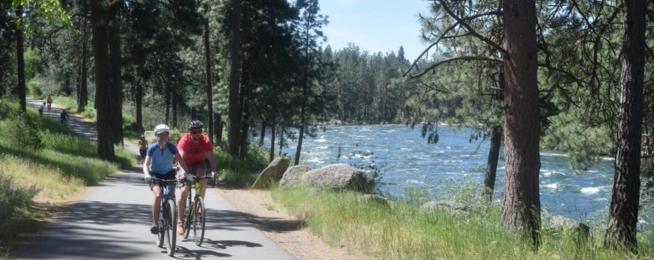There has never been a better time to expand and improve the recreation trails network and get more people riding and walking in the regions.
Following the big burn across the nation, there is an urgent need for new attractions to bring people to devastated towns in the back-blocks, generating new economic activity.
Now, further evidence has emerged from the United States to support the case for a strong investment pipeline for new trails across Australia.
The trails in Washington State in the US north east contribute more than US$8.2 billion to the state’s economy, according to two companion studies for the Washington State Recreation and Conservation Office.
The studies look at the economic, environmental, social and health benefits of trails and recommend that state leaders develop more trails and use them as a way to improve the health of Washingtonians.
One study, Economic, Environmental, & Social Benefits of Recreational Trails in Washington State, estimates that trail-based activities improve health and reduce medical costs by more than $390 million a year for Washington residents. In addition, trails support 81,000 jobs annually.
“We know that trails provide a lot of benefits. People are healthier when they use trails, trails are good for local businesses and trails are better for the environment,” said Kaleen Cottingham, director of the state Recreation and Conservation Office.
“It just makes sense that state and local leaders should invest in this valuable commodity. Not only will people benefit, but so will the state overall.”

A companion report, Health Benefits of Contact with Nature, looks at the health benefits associated with trails and other outdoor activities.
It notes an abundance of benefits from hiking, biking and walking such as improved heart and lung fitness, fewer cardiovascular risk factors, fewer deaths and less coronary heart disease, cancer risk and obesity.
It also notes that outdoor exercise, such as on trails, can improve mood, restore attention and decrease anger, depression and stress.
“This is critical because Washington has more adults suffering from depression and mental illness, and children reporting more major depressive episodes each year than the national average,” Cottingham said.
“Children especially can benefit from being outdoors because it is more conducive to social play, emotional development and improved thinking than indoor activity.”
“Bikes mean business. We’ve known this for a long time, but the findings of this study now paint a detailed picture of how communities across Washington State benefit from biking,” said Richard Smith, executive director of Washington Bikes.
“In addition to boosting our state’s bottom line through industry, tourism and more, biking brings major benefits for our mental and physical health.
"By building more connected trails statewide, we’ll ensure that every Washingtonian has the opportunity to pedal into a healthier future–and Washington will continue to prosper.”
The reports recommend improving the state’s trail system by encouraging new trail development in strategic areas, such as where there are too few trails or overcrowded trails, and by encouraging trail development that promotes overnight trips, which generate more money because people are spending multiple days on trails.
The reports also recommend improving trail amenities, improving collection of data on trail use and developing a standard permitting process statewide to make it easier to build trails.
A key recommendation is to use trails as a health intervention.
"The physical and mental health benefits associated with trails makes them potential pathways to improve health outcomes among vulnerable populations.
"Exposure to nature is even being prescribed by doctors because of the physical, mental, and social benefits," the study notes.
Increased access to trails can be accomplished by marketing campaigns creating awareness about local trails, building new trails, or lowering barriers to entry to access trails by connecting public transport, and developing integrated trail networks that connect to where people live.
Become our friend
Find out more about Bicycle Network and support us in making it easier for people to ride bikes.


